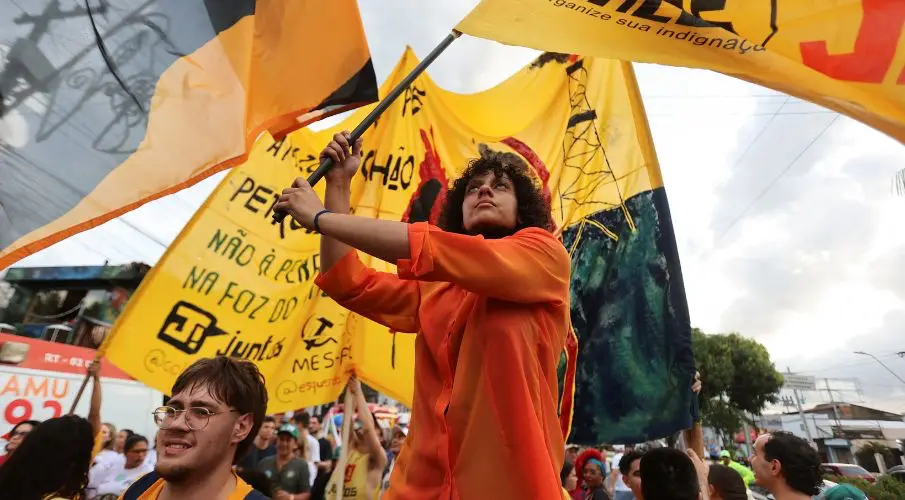They came in boats, buses, trucks, on foot and with the unshakable determination of those who know that time is running out for them. From the Andes of Ecuador, the rainforests of Peru, the savannas and forests of Brazil. Thousands. Young and old. Women and men. A current of voices that can no longer be ignored. And in Belém, where the Amazon dissolves into a shimmering delta, that current became a wave that shook the summit.
For the first time in the long history of climate conferences, their presence was not only visible - it was the center. In the Blue Zone, on the campus of the University of Pará, in the streets and squares of the city. A new rhythm pulsed through this summit, and it came from those regions that have paid the price for the decisions of others for centuries.

Katty Gualinga, 25, from Ecuador, stood at the entrance of the conference grounds, her face painted with the fine lines of her community, her voice hoarse from days of speaking. Her journey took 31 days, beginning on a glacier on the Cayambe Volcano and continuing along rivers that run like veins through the Amazon region. Dozens joined her. They called their journey Yaku Mama - mother of water. "The forests are drying. The heat is rising. And yet we are the ones protecting life in the forest," she said. A sentence that lingered in Belém like an echo from a future that is not possible without these voices.
While outside, demonstrators held a giant inflatable cobra aloft - a symbol of their demands, a call for financing, recognition, protection - diplomats inside discussed whether a global agreement was still possible now that the United States is once again trying to slip out of responsibility. Andreas Bjelland Eriksen, Norway’s climate minister, put it cautiously: "If we can have the chance here in Belém to really talk about this difficult topic, that would be good." The sentence sounded as if it had barely brushed the reality on the streets of the city.

For the reality was that Indigenous delegations were blocking the summit in order to open it. On Friday morning, dozens sat peacefully at the main entrance of the conference site, forcing state representatives to find other routes. On Tuesday, a smaller group entered the meeting area, clashing with security forces, two guards were injured. Major organizations like the Articulation of Indigenous Peoples of Brazil distanced themselves but emphasized the right to protest. The message was clear: we are not merely part of the conversation anymore - we insist that you listen.
Sônia Guajajara, Brazil’s minister for Indigenous peoples, estimated the number of Indigenous participants at around 5,000. About 900 had official accreditation for the innermost area of the summit. "There is no solution to the climate crisis without Indigenous peoples," she said. No claim, no exaggeration - a sober fact. Because scientific studies all over the world show that where Indigenous groups hold full land rights, forests do not fall prey to fire and exploitation. Biodiversity endures, protected areas remain, and that is what ultimately secures those cities where today’s decision makers debate emissions curves and temperature targets.

But Belém exposed with unsparing clarity how far aspiration and reality diverge. In Brazil, 107 Indigenous territories are waiting for final recognition. Some for decades. Others for generations. While President Lula has signed more demarcations this year than his predecessors did in nearly ten years combined, he has also approved an oil drilling project near the mouth of the Amazon - an affront felt everywhere here.
Angela Amanakwa Kaxuyana, who has spent 22 years fighting for recognition of her two million hectare territory, put it bluntly: "We cannot leave this COP without it being clear that Indigenous peoples are part of the solution." A sentence that sounded more like a final ultimatum than a demand. Internationally, too, the landscape is shifting. Norway, the United Kingdom, the Netherlands and Germany have renewed their 2021 climate financing pledge - another five years, not four, as some media initially reported. At least twelve states aim to recognize the rights to 160 million hectares of Indigenous land by 2030. Numbers that sound like a lot, but in light of global extraction dynamics resemble only first steps.

And yet: in Belém one could feel that something was tilting. Not abruptly, not loudly - but definitively. The loudest sound of the summit was not that of the heads of state but that of the delegations that had been kept outside for decades. People who live in the forests, who protect the world from the worst even though they themselves are the most threatened. The summit is called COP30. But in Belém it was above all one thing: COP of the present. COP of upheaval. COP of those who no longer occupy the margins but the center.
The return of the guardians has begun. And anyone who ignores their voices today will not be able to claim tomorrow that they did not know.
Investigative journalism requires courage, conviction – and your support.
Please help strengthen our journalistic fight against right-wing populism and human rights violations. Every investigative report, every piece of documentation, every day and every night – all of it requires time, research and legal protection. We do not rely on advertising or corporations, but solely on people who make independent journalism possible. People like you.
Not everyone can give the same amount. But everyone can make a difference. Every contribution protects a piece of journalistic independence.
Updates – Kaizen News Brief
All current curated daily updates can be found in the Kaizen News Brief.
To the Kaizen News Brief In English
Danke für die Berichte darüber. Für die Welt ist das wichtig, für die meisten Medien leider nicht. Das zeigt auf, wo die Welt hingekommen ist.
ich danke dir, ja leider kommen diese themen unter die räder und sind dabei von ausserordentlicher bedeutung